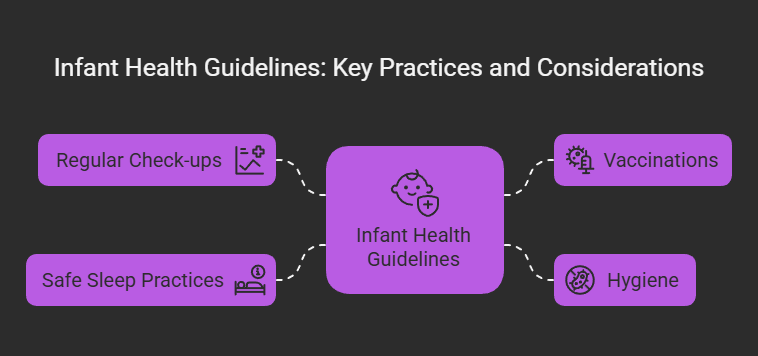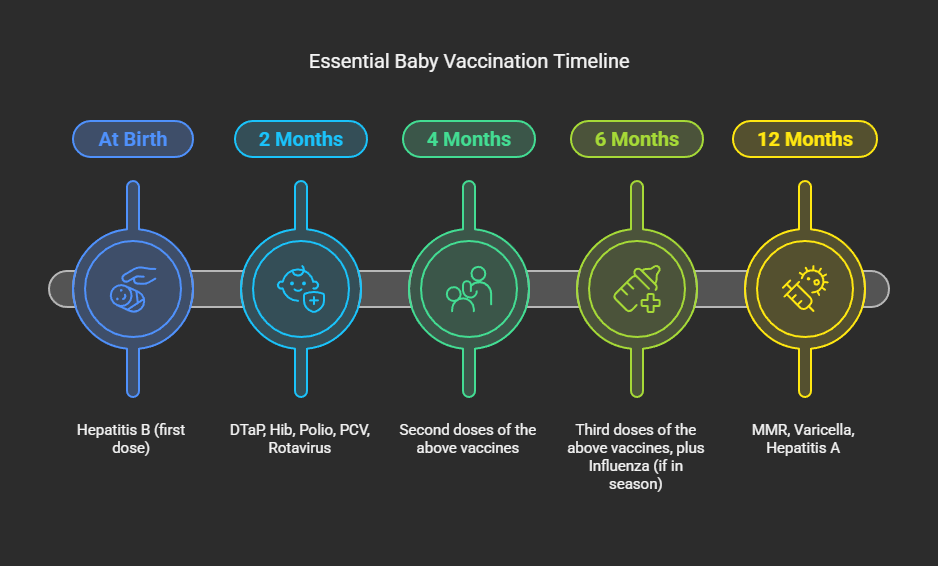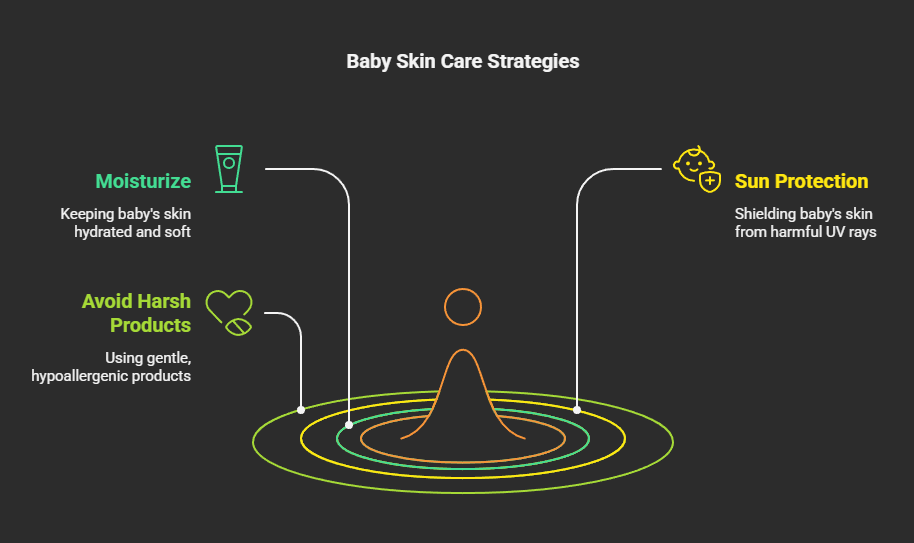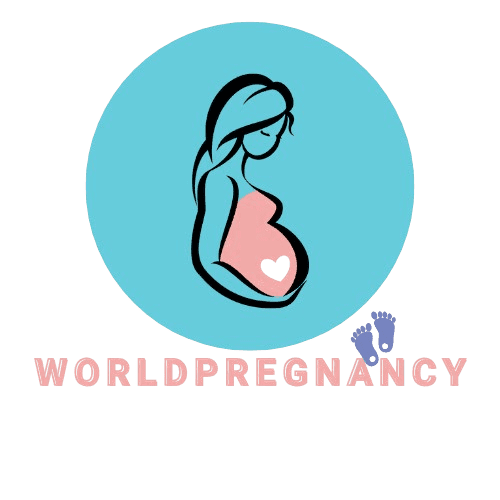Welcoming a newborn into your life is a joyous and transformative experience. However, it also comes with a lot of responsibilities, especially when it comes to ensuring your baby’s health and well-being. As a new parent, you might feel overwhelmed by the sheer amount of information available. To help you navigate this journey, we’ve compiled essential baby health tips that cover everything from nutrition to sleep, hygiene, and more. Let’s dive in!

Introduction to Baby Health
Your baby’s health is the foundation of their growth and development. From the moment they are born, every decision you make—whether it’s about feeding, sleeping, or hygiene—plays a crucial role in shaping their future. This guide will walk you through the essential baby health tips that every new parent should know.
Newborn Care Tips
Newborns are delicate and require special care. Here are some newborn care tips to keep in mind:
Keep Your Baby Warm: Newborns cannot regulate their body temperature well. Dress them in one or two layers more than adults and always cover their head with a soft hat.
Delay the First Bath: Wait at least 24 hours after birth before giving your baby their first bath. This helps protect their sensitive skin and maintain body temperature.
Umbilical Cord Care: Keep the umbilical cord dry and clean. Avoid applying any creams or powders unless advised by your pediatrician.
Monitor for Danger Signs: Watch for signs like fast breathing, high fever, or poor feeding, and consult a doctor immediately if you notice anything unusual.
Infant Health Guidelines

To ensure your baby stays healthy, follow these infant health guidelines:
Regular Check-ups: Schedule regular visits to the pediatrician to monitor your baby’s growth and development.
Vaccinations: Stay up-to-date with your baby’s vaccination schedule to protect them from preventable diseases.
Hygiene: Wash your hands thoroughly before handling your baby to prevent the spread of germs.
Safe Sleep Practices: Always place your baby on their back to sleep to reduce the risk of Sudden Infant Death Syndrome (SIDS).
Baby Nutrition Advice
Proper nutrition is vital for your baby’s growth. Here’s some baby nutrition advice:
Breastfeeding: Breast milk is the best source of nutrition for your baby. It provides essential antibodies and nutrients.
Introduce Solids Gradually: Start introducing solid foods around 6 months of age. Begin with single-ingredient purees and watch for any allergic reactions.
Hydration: Ensure your baby stays hydrated, especially in hot weather. Offer small sips of water once they start eating solids.
Baby Sleep Tips
Sleep is crucial for your baby’s development. Follow these baby sleep tips:
Create a Routine: Establish a consistent bedtime routine to help your baby understand when it’s time to sleep.
Safe Sleep Environment: Use a firm mattress and avoid placing soft toys or blankets in the crib.
Comfort Your Baby: If your baby wakes up crying, comfort them with gentle rocking or soothing sounds.
Baby Vaccination Schedule

Vaccinations protect your baby from serious illnesses. Here’s a general baby vaccination schedule:
At Birth: Hepatitis B (first dose)
2 Months: DTaP, Hib, Polio, PCV, Rotavirus
4 Months: Second doses of the above vaccines
6 Months: Third doses of the above vaccines, plus Influenza (if in season)
12 Months: MMR, Varicella, Hepatitis A
Always consult your pediatrician for a personalized schedule.
Baby Hygiene Practices
Good hygiene is essential to keep your baby healthy. Follow these baby hygiene practices:
Bathing: Bathe your baby 2-3 times a week using lukewarm water and mild baby soap.
Diaper Care: Change diapers frequently to prevent rashes. Clean the area with warm water and pat dry.
Nail Care: Trim your baby’s nails regularly to prevent scratching.
Baby Growth Milestones
Track your baby’s development with these growth milestones:
0-3 Months: Lifts head, smiles, follows objects with eyes.
4-6 Months: Rolls over, sits with support, babbles.
7-9 Months: Crawls, stands with support, says simple words like “mama.”
10-12 Months: Walks with assistance, points at objects, understands simple commands.
Common Baby Illnesses
Be aware of these common baby illnesses:
Colds: Keep your baby hydrated and use a humidifier to ease congestion.
Diaper Rash: Apply a diaper rash cream and change diapers frequently.
Fever: Consult your pediatrician if your baby’s temperature exceeds 100.4°F (38°C).
Baby Skin Care Tips

Your baby’s skin is sensitive and requires special care. Follow these baby skin care tips:
Moisturize: Use a gentle, fragrance-free moisturizer to keep your baby’s skin soft.
Sun Protection: Avoid direct sunlight and use baby-safe sunscreen if necessary.
Avoid Harsh Products: Use only hypoallergenic and baby-friendly products.
Baby Feeding Tips
Feeding your baby can be challenging. Here are some baby feeding tips:
Watch for Hunger Cues: Look for signs like sucking on fists or turning their head toward your hand.
Feed Slowly: Allow your baby to eat at their own pace to prevent choking.
Encourage New Tastes: Introduce a variety of foods to develop their palate.
FAQs
Q1: How often should I bathe my newborn?
A: Bathe your newborn 2-3 times a week to avoid drying out their skin.
Q2: When should I start brushing my baby’s teeth?
A: Start brushing as soon as the first tooth appears, using a soft-bristled baby toothbrush.
Q3: How can I soothe a crying baby?
A: Try rocking, swaddling, or singing to your baby. Sometimes, a change of environment can also help.
Q4: What should I do if my baby has a fever?
A: Consult your pediatrician immediately if your baby is under 3 months old and has a fever.
Conclusion
Caring for a newborn is a rewarding yet challenging journey. By following these essential baby health tips, you can ensure your baby grows up healthy and happy. Remember, every baby is unique, so trust your instincts and consult your pediatrician whenever you have concerns. Happy parenting!
